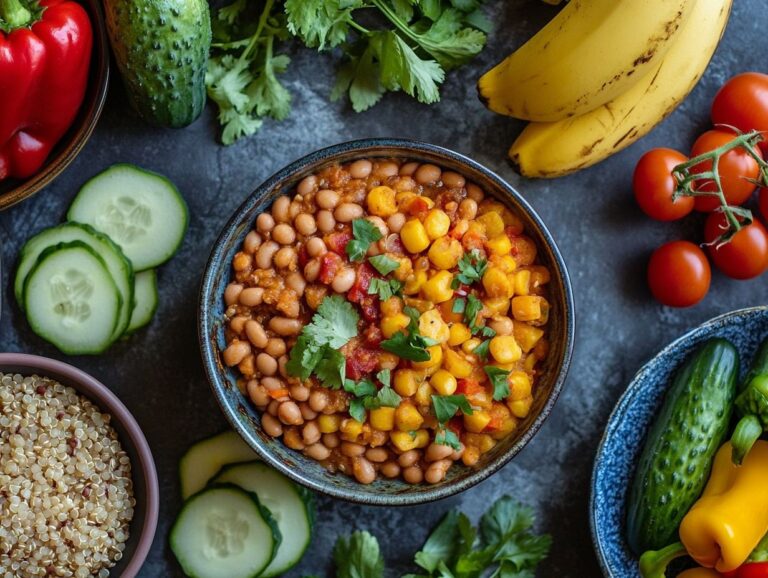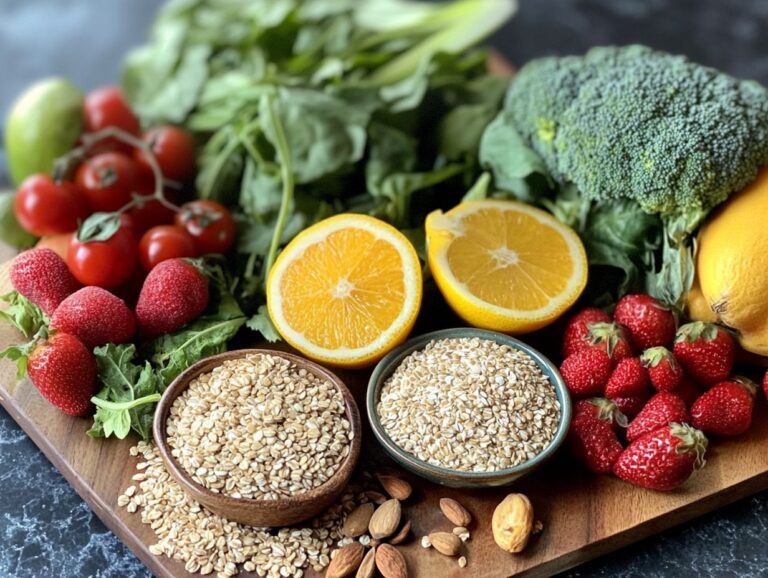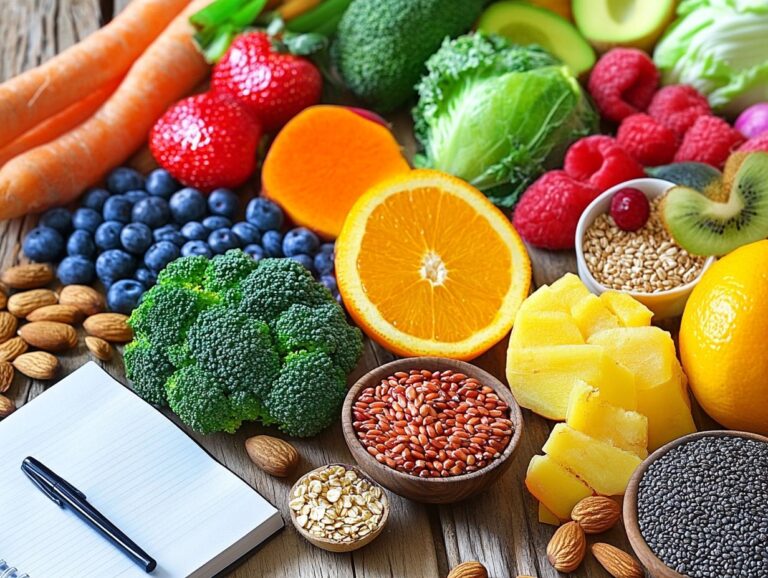Inflammation is a natural response of the body; however, when it becomes chronic, it can lead to serious health issues. This article explores the connection between inflammation and diet, with a particular focus on the benefits of adopting a vegan lifestyle. We will provide insights on what inflammation is, how it impacts health, and highlight a rich array of plant-based foods that combat inflammation, including anti-inflammatory foods rich in antioxidants and omega-3 fatty acids. Additionally, we will offer tips for integrating a vegan diet into your life, focusing on meal plans that include nutrient-dense options to meet your nutritional needs. Are you ready to discover the anti-inflammatory power of plants? Join us as we uncover the transformative potential of a vegan lifestyle for your health and well-being.
Key Takeaways:
- A vegan diet can help reduce inflammation due to its high antioxidant and omega-3 fatty acid content.
- Incorporating a vegan diet may lower the risk of chronic diseases and promote weight loss through healthy eating habits and meal planning.
- Starting slow, experimenting with different foods, including plant-based proteins, and ensuring proper nutrient intake can help successfully transition to a vegan diet.
What is Inflammation?
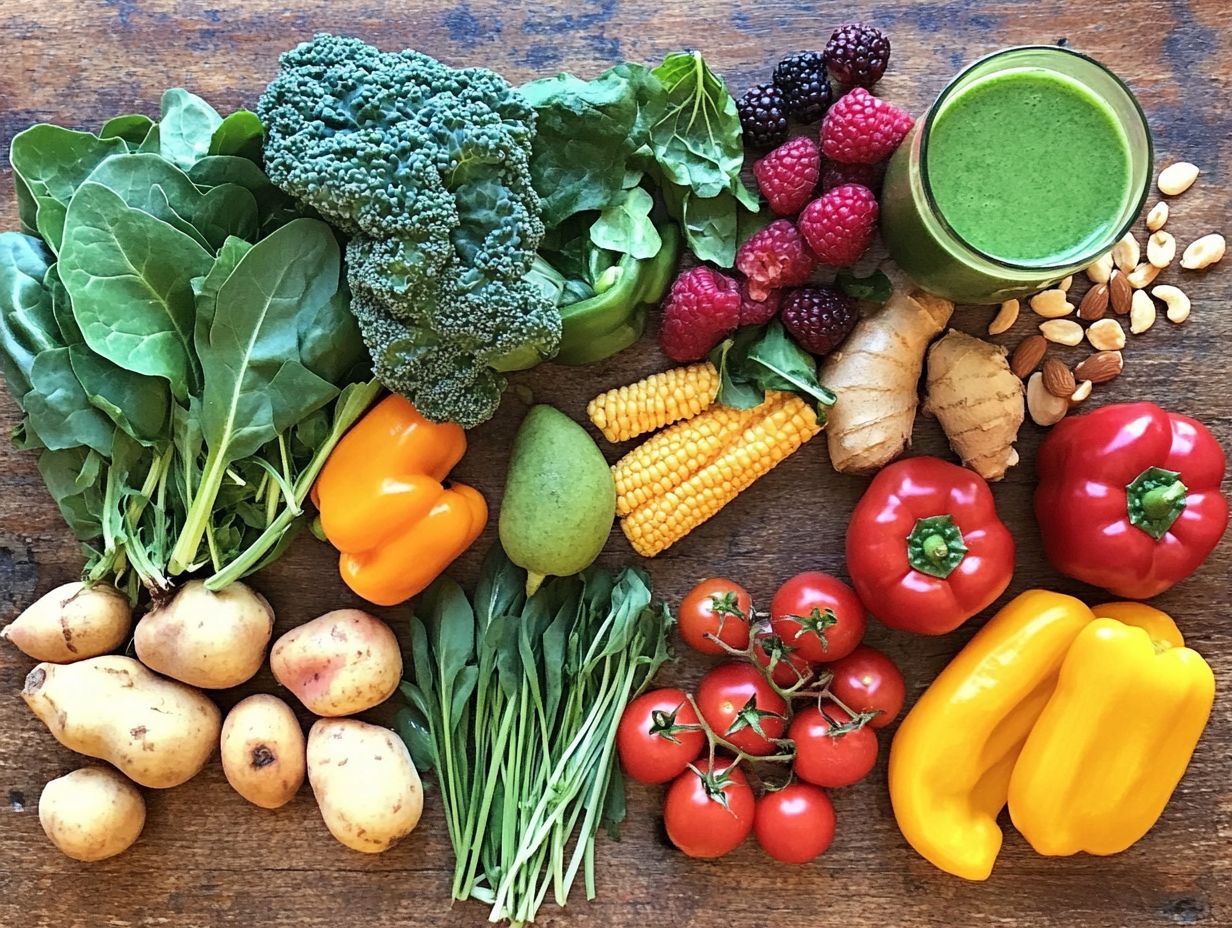 Inflammation is the body’s complex biological response to harmful stimuli, including pathogens, damaged cells, or irritants, and understanding the inflammation response is key to inflammation prevention. It is characterized by redness, swelling, heat, and pain, serving as a protective mechanism intended to heal the body and restore health. However, chronic inflammation is linked to various diseases, including diabetes and heart disease. Elevated levels of inflammation markers, such as C-reactive protein, indicate ongoing inflammation symptoms and can lead to serious complications if left untreated.
Inflammation is the body’s complex biological response to harmful stimuli, including pathogens, damaged cells, or irritants, and understanding the inflammation response is key to inflammation prevention. It is characterized by redness, swelling, heat, and pain, serving as a protective mechanism intended to heal the body and restore health. However, chronic inflammation is linked to various diseases, including diabetes and heart disease. Elevated levels of inflammation markers, such as C-reactive protein, indicate ongoing inflammation symptoms and can lead to serious complications if left untreated.
How Does Inflammation Affect the Body?
Inflammation can have both positive and negative effects on the body. In the short term, it promotes healing by initiating various immune processes. However, chronic inflammation can be detrimental to health and is linked to several chronic diseases, including diabetes, heart disease, and arthritis, affecting overall health conditions. Common symptoms of chronic inflammation include fatigue, pain, and swelling. Understanding the inflammation response is crucial for identifying anti-inflammatory foods and dietary practices that can help mitigate the harmful effects of inflammation and promote inflammation reduction.
What is a Vegan Diet?
A vegan diet is a plant-based eating pattern that excludes all animal products, including meat, dairy, and eggs, while focusing on a diverse array of fruits, vegetables, whole grains, legumes, nuts, and seeds, providing fiber sources essential for dietary fiber intake. This diet not only aims to fulfill an individual s nutritional requirements with nutrient-dense foods but also highlights the significance of meal planning and preparation to ensure balanced and healthy meals, meeting one’s nutritional needs. For those new to the vegan lifestyle, consulting with a registered dietitian can be beneficial in ensuring that all essential nutrients are adequately included, thus supporting diabetes management and other health benefits.
What Foods are Included in a Vegan Diet?
A vegan diet consists of a variety of plant foods and plant-based proteins, which are often rich in essential nutrients and healthy fats necessary for a balanced diet. For instance, fruits, vegetables, whole grains, legumes, nuts, and seeds are excellent sources of dietary fiber, antioxidants, and other phytochemicals that contribute to the health benefits of a vegan diet.
- Leafy green vegetables, such as kale and spinach, are abundant in vitamins A, C, and K.
- Colorful fruits, including berries and citrus fruits, provide antioxidants that help reduce inflammation.
- Whole grains like quinoa and brown rice offer complex carbohydrates for energy and are also rich in minerals such as iron and magnesium, essential for a healthy lifestyle.
- Legumes, such as lentils and chickpeas, serve as good sources of protein and assist in stabilizing blood sugar levels, contributing to healthy meals.
- Additionally, nuts and seeds, including almonds and chia seeds, are rich in omega-3 fatty acids, which help protect heart health and are vital components of a Mediterranean diet.
What Foods are Excluded from a Vegan Diet?
A vegan diet excludes all animal products, which encompasses meat, poultry, fish, dairy, and eggs, as well as any ingredients derived from animals, such as gelatin and certain additives. This exclusion is important not only for ethical and environmental reasons but also for reducing the consumption of inflammatory foods that can exacerbate chronic inflammation and related health conditions. By avoiding these items, individuals can decrease their intake of saturated fats and arachidonic acid, both of which can promote inflammatory reactions in the body. A well-planned vegan diet can include a variety of anti-inflammatory alternatives, such as whole grains, nuts, seeds, and an array of fruits and vegetables. Legumes serve as an excellent source of protein, fiber, and antioxidants that contribute to inflammation reduction and meet nutritional needs. Additionally, spices like turmeric and ginger can enhance the anti-inflammatory effects of meals, making it easier to maintain good health while following a vegan diet, supported by nutrition education on dietary choices.
What Are the Benefits of a Vegan Diet?
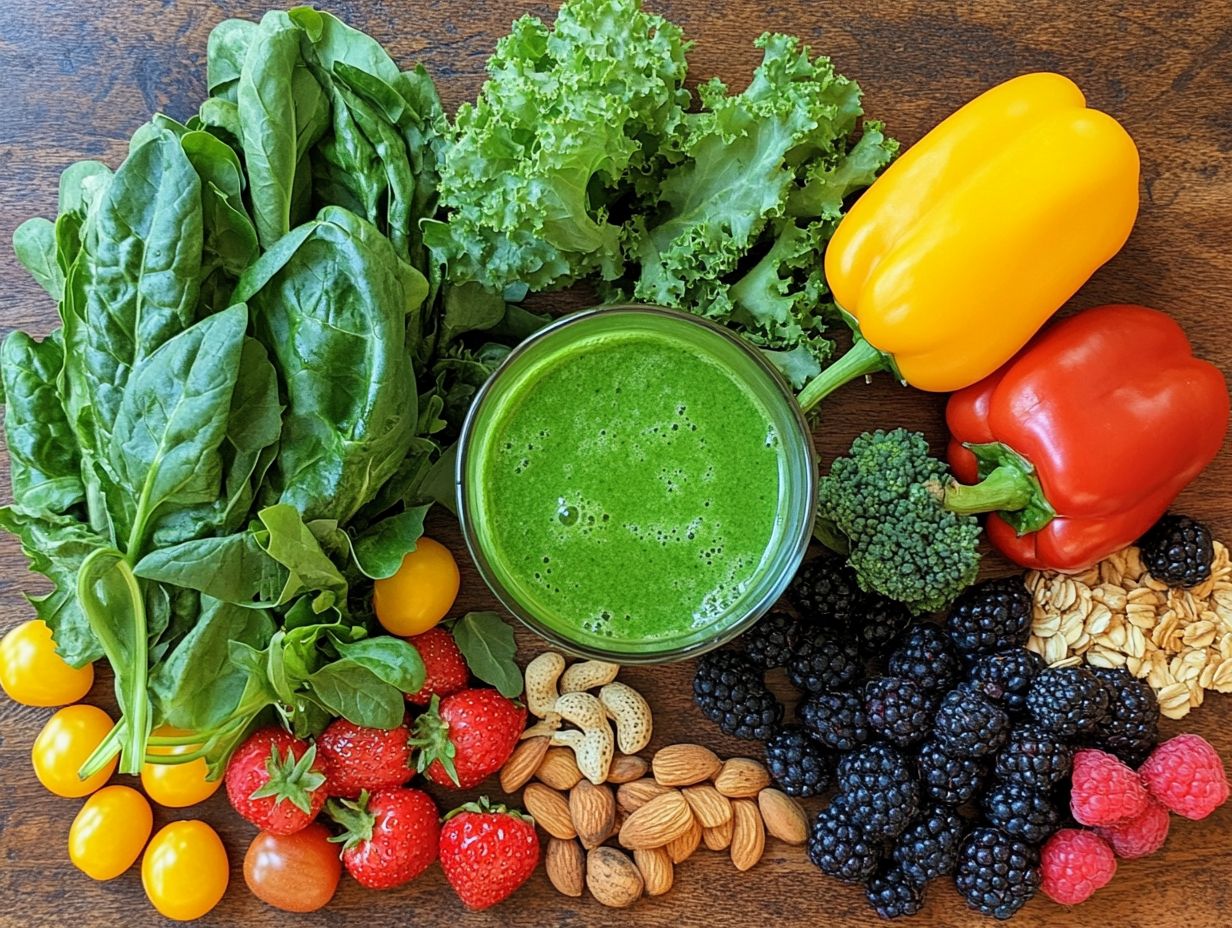 A vegan diet offers numerous advantages, including a lower risk of many chronic diseases, improved gut health, and the promotion of healthy meals that follow anti-inflammatory eating patterns supported by health education. A well-balanced vegan diet can help reduce inflammation, thereby enhancing overall health and wellness through inflammation prevention. Additionally, it is rich in dietary fiber, antioxidants, and phytochemicals, all of which are essential for maintaining good health.
A vegan diet offers numerous advantages, including a lower risk of many chronic diseases, improved gut health, and the promotion of healthy meals that follow anti-inflammatory eating patterns supported by health education. A well-balanced vegan diet can help reduce inflammation, thereby enhancing overall health and wellness through inflammation prevention. Additionally, it is rich in dietary fiber, antioxidants, and phytochemicals, all of which are essential for maintaining good health.
1. Reduces Inflammation
A vegan diet can help decrease inflammation by avoiding inflammatory foods and emphasizing the consumption of anti-inflammatory options rich in antioxidants. This includes foods such as fruits, vegetables, nuts, seeds, and healthy fats like omega-3 fatty acids found in flaxseeds and chia seeds. These dietary patterns are effective in lowering inflammation markers in the body and promoting optimal health. For example, including a diverse range of berries not only enhances flavor but also provides potent phytonutrients that help reduce oxidative stress, a major contributor to chronic inflammation. Leafy greens, such as spinach and kale, are rich in vitamins A, C, and K, which are essential for regulating the immune response. Nuts like walnuts and almonds offer healthy fats that inhibit inflammatory pathways, benefiting both cardiovascular and joint health. Whole grains, such as quinoa and brown rice, provide essential fiber necessary for gut health and help reduce systemic inflammation by supporting a balanced microbiome, addressing inflammation symptoms. Together, these plant-based options offer synergistic health benefits that promote vitality and resilience, aligned with healthy lifestyle choices.
2. Lowers Risk of Chronic Diseases
A vegan diet reduces the risk of chronic diseases such as heart disease, diabetes, and certain cancers by promoting nutrient-dense dietary patterns that are rich in fiber and essential vitamins suitable for diabetes management. Emphasizing plant-based foods helps individuals maintain a healthy weight and lowers the incidence of diseases associated with chronic inflammation. Research studies consistently support this assertion, indicating that individuals who follow vegan diets tend to have lower cholesterol levels and blood pressure, fostering better eating habits. For instance, a study published in the Journal of the American Heart Association found that vegans face a 30-50% lower risk of developing heart disease compared to omnivores. The dietary patterns typical of veganism, which prioritize legumes, whole grains, and a variety of fruits and vegetables, are linked to better glycemic control, significantly reducing the risk of type 2 diabetes. Additionally, observational studies have shown that plant-based diets are associated with a lower risk of colorectal and breast cancers, emphasizing the importance of plant-based foods. These findings highlight the substantial impact that lifestyle modifications can have on long-term health outcomes.
3. Promotes Weight Loss
The vegan diet can promote healthy weight loss by encouraging the consumption of filling, high-fiber foods that are lower in calories, thereby making it easier to maintain a healthy calorie intake with recipe development and meal prep. Meal preparation and planning allow individuals to enjoy balanced meals that support both weight loss and overall health. By incorporating a variety of plant-based ingredients such as legumes, whole grains, fruits, and vegetables, individuals can benefit from higher nutritional value while feeling fuller for longer. When creating a meal plan, it is advisable to include foods like lentils, quinoa, and leafy greens, which are rich in fiber and protein, providing satisfying meals without excess calories, supported by effective meal planning. Meal prep helps individuals avoid impulse eating and facilitates healthier choices, with useful cooking tips and strategies. By selecting nutrient-dense foods and experimenting with different recipes, anyone can apply the principles of a vegan diet to enhance their weight loss journey while savoring delicious and satisfying meals.
4. Improves Gut Health
The vegan diet enhances gut health primarily due to the high levels of dietary fiber found in plant-based foods. This fiber helps keep the digestive system functioning properly and promotes a diverse gut microbiome. Improved gut health can lead to better nutrient absorption and a range of health benefits, including reduced inflammation and enhanced immunity. Foods such as lentils, beans, and whole grains provide essential prebiotics that nourish beneficial gut bacteria. Additionally, fermented foods like sauerkraut, kimchi, and plant-based yogurts are excellent for promoting probiotic growth and supporting a healthy balance of gut flora. To further improve gut health, individuals should aim to include a variety of colorful fruits and vegetables in their diets, as these foods offer vital nutrients and antioxidants that aid in digestion and support chronic inflammation management. Drinking plenty of water and minimizing the intake of processed foods can also contribute to maintaining overall gut health, enhancing inflammation reduction and prevention.
How Can a Vegan Diet Help Reduce Inflammation?
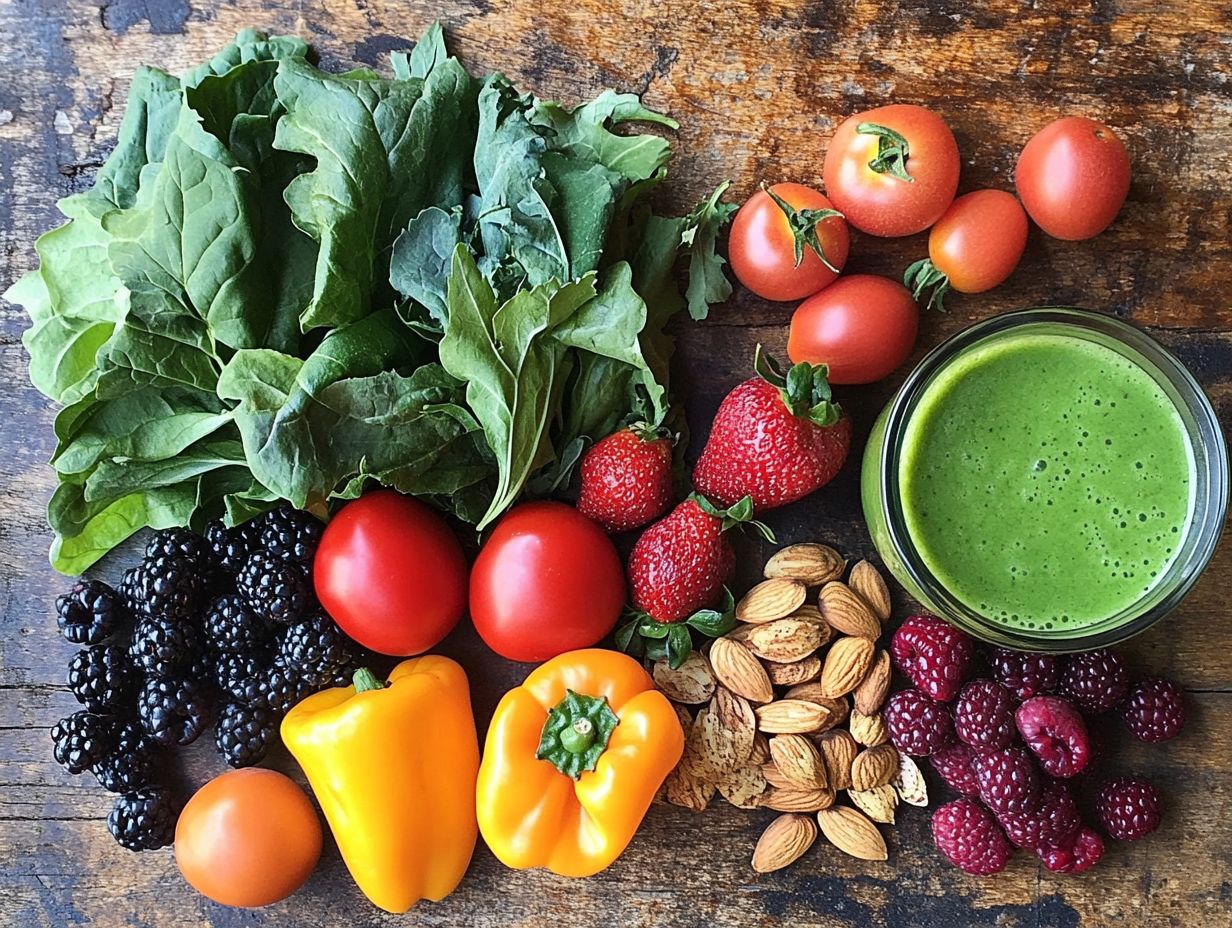 A vegan diet can help reduce inflammation due to its abundance of antioxidants, omega-3 fatty acids, and other nutrient-dense foods that counteract inflammatory processes in the body, including chronic inflammation and inflammation response. By adhering to a strict plant-based diet and making mindful dietary choices, individuals can significantly lower inflammation levels, manage inflammation symptoms, and enhance their overall health and gut health.
A vegan diet can help reduce inflammation due to its abundance of antioxidants, omega-3 fatty acids, and other nutrient-dense foods that counteract inflammatory processes in the body, including chronic inflammation and inflammation response. By adhering to a strict plant-based diet and making mindful dietary choices, individuals can significantly lower inflammation levels, manage inflammation symptoms, and enhance their overall health and gut health.
1. Rich in Antioxidants
A vegan diet is rich in antioxidants derived from a variety of fruits, vegetables, and whole grains, all of which are known to reduce oxidative stress, inflammation, and inflammation markers. Anti-inflammatory foods provide phytochemicals that support the body’s natural inflammatory processes and inflammation prevention. These compounds work to neutralize free radicals, thereby reducing cell damage and lowering inflammatory markers within the body. For instance, foods such as berries, green leafy vegetables, and nuts are high in vitamins, flavonoids, and carotenoids. Incorporating turmeric, which contains the active ingredient curcumin, along with green leafy vegetables like spinach and fenugreek, may further enhance anti-inflammatory properties and provide valuable fiber sources. Additionally, whole grains like quinoa and brown rice contribute to this effect by providing both fiber and antioxidants.
2. High in Omega-3 Fatty Acids
Although omega-3 fatty acids are primarily sourced from fish, a vegan diet can also provide these essential long-chain fats through foods such as flaxseeds, chia seeds, and walnuts, all of which possess anti-inflammatory properties and contribute to inflammation reduction. Incorporating these foods into one’s diet can significantly enhance inflammation management and overall well-being.
3. Lowers Intake of Inflammatory Foods
A vegan diet inherently lowers the intake of inflammatory foods commonly found in the Western diet, such as processed meats and high-sugar products, thereby reducing the risk of chronic inflammation and related diseases. This can be further enhanced by choosing whole foods and plant-based products to maximize health benefits. This intentional shift has the potential to improve health markers, as studies have demonstrated a direct link between decreased consumption of inflammatory agents and lower levels of inflammation-related diseases. Additionally, foods like refined grains and inflammatory oils can contribute to bodily inflammation, but healthier alternatives are available.
- For instance, white bread can be substituted with whole grain or sprouted bread, which are more nutritious and less inflammatory.
- Moreover, healthy fats such as avocados and nuts can replace harmful trans fats found in many processed snacks.
What are Some Tips for Incorporating a Vegan Diet?
The best tips for starting a vegan diet focus on making your transition to a plant-based lifestyle easier and more enjoyable while ensuring that you consume healthy meals that meet your nutritional needs and manage calorie intake effectively. Meal prepping, experimenting with a variety of plant-based foods, and opting for a balanced diet are all effective strategies to help make the process smoother and more enjoyable.
1. Start Slowly
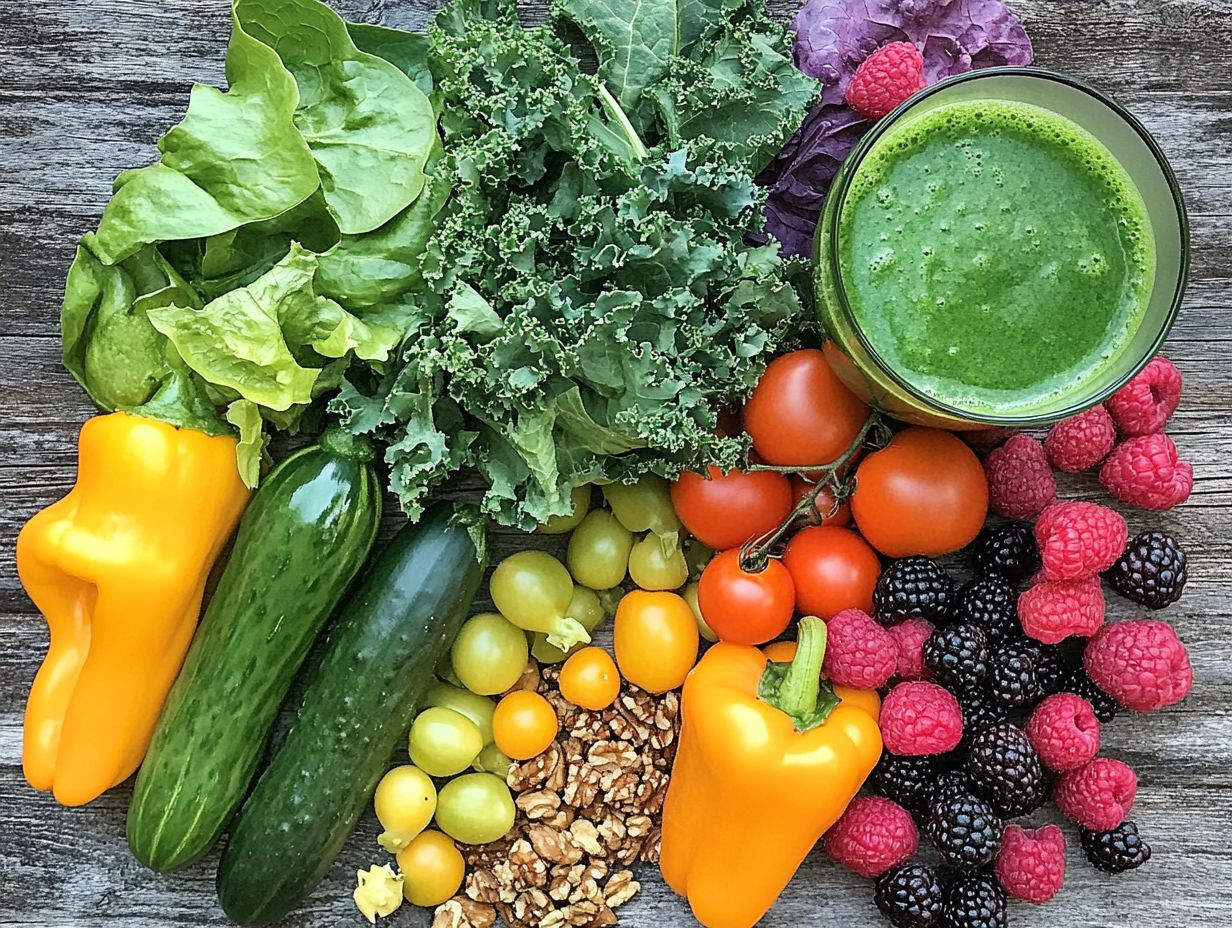 Adopting a vegan diet can be done gradually, allowing individuals to transition their eating habits in a way that makes it easier to incorporate healthy meals and maintain a balanced lifestyle. This approach ensures that each meal remains nutritionally adequate while individuals take the time to explore and discover plant-based options. By making small changes, such as adding one vegan meal per day or substituting dairy with plant-based alternatives, people can gradually modify their eating patterns. These manageable adjustments are more likely to result in long-term success. Resources such as meal planning apps, grocery delivery services, and online communities can offer valuable support and inspiration for those slowly adopting a vegan lifestyle. Focusing on whole foods, including legumes, nuts, seeds, and whole grains, along with plenty of fruits and vegetables, can help ensure a nutritionally adequate vegan diet. Shopping at local farmers’ markets for fresh, seasonal ingredients can also foster a connection to the community and local agricultural producers. Additionally, participating in cooking demonstrations and nutrition education can enhance your understanding of plant-based diets. Gradual changes will help make this positive lifestyle adjustment sustainable, ultimately becoming a rewarding part of everyday life.
Adopting a vegan diet can be done gradually, allowing individuals to transition their eating habits in a way that makes it easier to incorporate healthy meals and maintain a balanced lifestyle. This approach ensures that each meal remains nutritionally adequate while individuals take the time to explore and discover plant-based options. By making small changes, such as adding one vegan meal per day or substituting dairy with plant-based alternatives, people can gradually modify their eating patterns. These manageable adjustments are more likely to result in long-term success. Resources such as meal planning apps, grocery delivery services, and online communities can offer valuable support and inspiration for those slowly adopting a vegan lifestyle. Focusing on whole foods, including legumes, nuts, seeds, and whole grains, along with plenty of fruits and vegetables, can help ensure a nutritionally adequate vegan diet. Shopping at local farmers’ markets for fresh, seasonal ingredients can also foster a connection to the community and local agricultural producers. Additionally, participating in cooking demonstrations and nutrition education can enhance your understanding of plant-based diets. Gradual changes will help make this positive lifestyle adjustment sustainable, ultimately becoming a rewarding part of everyday life.
2. Experiment with Different Foods
Exploring a variety of foods within a vegan diet can enhance your culinary experience, support your health education, and provide a broader range of nutrients, making meal preparation more enjoyable and versatile. Experimenting with new fruits and vegetables, along with various cooking methods, can foster innovation in recipe development and help maintain interest in plant-based eating. Consider incorporating unfamiliar grains such as quinoa, farro, or millet, which can add unique textures and flavors to your dishes and support healthy weight loss. Don’t hesitate to use vibrant spices and herbs; they have the power to transform everyday meals into extraordinary experiences. Embracing global cuisines can also inspire creativity, allowing you to craft delightful combinations that celebrate plant-powered principles. For example, Mediterranean dishes can introduce fresh ways to enjoy chickpeas and herbs, while Asian cuisines may highlight tofu and an array of flavorful sauces. By mixing and matching these ingredients, you can discover a delightful world of flavors, ensuring that each meal is fresh and exciting.
3. Make Sure to Get Enough Nutrients
Adopting a vegan diet can lead to nutrient deficiencies if not done correctly, as it necessitates sourcing a variety of foods to maintain balanced nutrition. Registered dietitians can assist individuals in this process by guiding them in making appropriate food choices, following a meal plan, and incorporating adequate amounts of healthy fats, proteins, vitamins, and minerals. The most common nutrient deficiencies among those following a plant-based lifestyle include:
- Vitamin B12
- Iron
- Calcium
- Omega-3 fatty acids
To meet nutritional goals, it is essential to include fortified foods, a variety of plant proteins, and an assortment of fruits and vegetables in the diet. Consuming vitamin C-rich foods alongside iron-rich plant foods can enhance iron absorption. Additionally, individuals should consider taking supplements, with vitamin B12 being the most crucial, as it is rarely found in plant-based sources, ensuring you meet your dietary fiber needs and support your healthy lifestyle.
Are There Any Risks or Drawbacks to a Vegan Diet?
Despite its numerous health benefits, a vegan diet carries certain risks and downsides, including the potential for nutrient deficiencies due to the elimination of entire food groups, which can affect health conditions and diabetes management. Individuals should educate themselves about their dietary choices and ensure nutritional adequacy through careful planning and, if necessary, supplementation to prevent negative health effects.
1. Potential Nutrient Deficiencies
Vegan diets can lead to nutrient deficiencies if individuals do not plan them carefully and ensure they are obtaining all the necessary vitamins and minerals. Some of the most important nutrients to monitor in a vegan diet include vitamin B12, iron, calcium, and omega-3 fatty acids. A registered dietitian can provide expert advice on how to effectively incorporate these nutrients into a vegan diet. Vitamin B12 is essential for the nervous system and red blood cell production; a deficiency can result in neurological problems and anemia. Since vitamin B12 is primarily found in animal products, individuals following a vegan diet typically need to consume fortified foods or take supplements. Iron plays a crucial role in the body’s ability to transport oxygen. While plant-based foods such as lentils, soybeans, spinach, chickpeas, pumpkin seeds, quinoa, and fortified cereals can provide iron, it is best absorbed when consumed with foods high in vitamin C. Calcium is necessary for healthy bones and other bodily functions. Vegans can obtain calcium from fortified plant milks and juices, as well as from various leafy greens, soy products, nuts, and seeds. Omega-3 fatty acids are vital for heart and brain function and can be sourced from flaxseeds, chia seeds, walnuts, and hemp seeds. By including these and other nutrient-rich foods in their meal plans, vegans can ensure they remain healthy and thrive.
2. Difficulty Eating Out
Eating out can be one of the biggest challenges of following a vegan diet due to the limited options available. When restaurants do not offer a wide range of plant-based meals, individuals adhering to a vegan diet may become frustrated and stray from their dietary choices, especially if they have not planned ahead. To ensure a positive dining experience, individuals should conduct some research in advance. Exploring menus for various restaurants online can help identify establishments that cater to vegans. Engaging with staff members while dining can also significantly enhance the experience. Inquiring about the ingredients in specific dishes or asking if certain ingredients can be omitted often leads to delicious creations that may not be listed on the menu. When attending social gatherings, consider suggesting venues with good vegan options or bringing a dish to share. With a little communication and exploration, everyone can enjoy a fulfilling meal without compromising their values.
3. Social Stigma
The social stigma surrounding a vegan diet can negatively impact individuals, leading to misunderstandings or judgments about their dietary choices. This stigma may result in feelings of isolation or pressure to conform to the eating habits of others. Navigating social situations, such as family dinners or outings with friends, can be particularly challenging for those following a vegan lifestyle. They may feel compelled to defend their dietary choices or find themselves in uncomfortable situations that highlight their differences, especially when discussing meal plans that prioritize plant-based foods. To combat social stigma, we can promote understanding and open communication. Educating friends and family about the moral, health, and environmental benefits of a vegan diet, including its role in inflammation prevention and the importance of health education, can help foster a more welcoming environment. Sharing delicious plant-based recipes or offering to prepare vegan-friendly snacks that friends would enjoy can spark interest and encourage acceptance. Engaging in cooking demonstrations or discussing the health benefits of anti-inflammatory foods like fruits, vegetables, and whole grains can also be a part of this initiative. This approach can transform potential conflicts into opportunities for connection and shared experiences.
